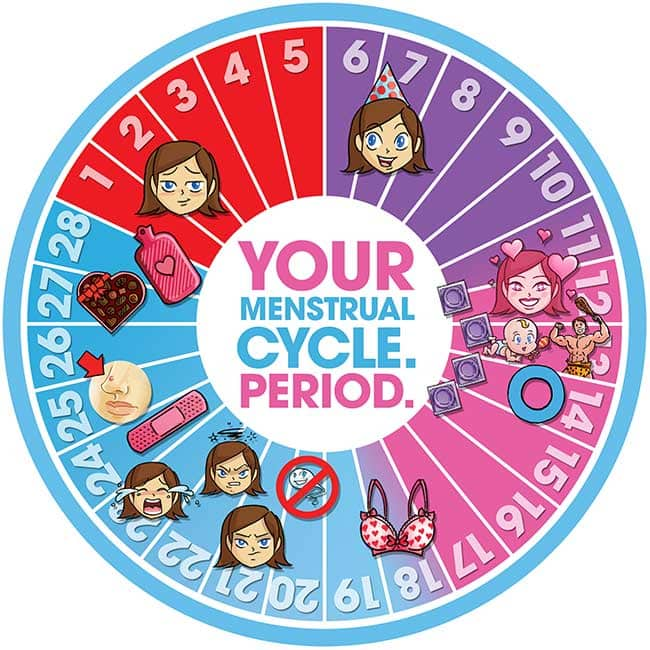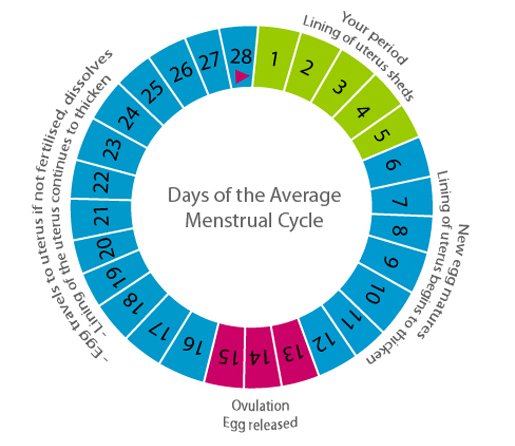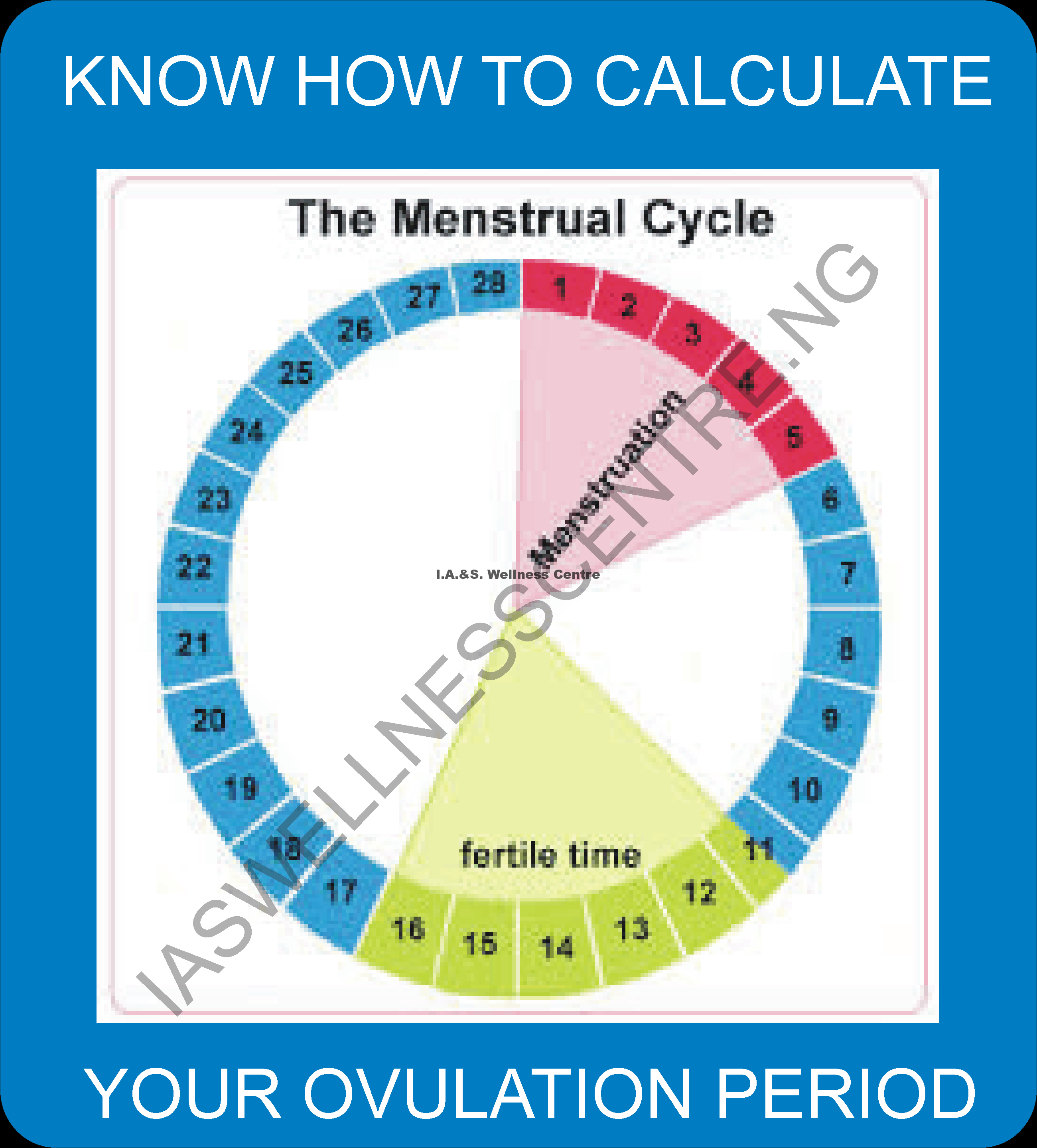How Many Days Should My Period Last
A common question women and young girls have around their monthly period is around how many days of each month they can expect to bleed. We are talking consistency today and how much this can vary from woman-to-woman, while also shedding light on how long the shedding of your uterine lining should take place in typical circumstances.
Typical reports of menstruation can last from one to seven days. The average lasts 3-5 days of bleeding. Its important to mention that these are averages and generalizations and can always be bounced against your OBGYN or other medical professionals advice for your specific body type and unique lifestyle. If your period is a couple days longer or shorter than the average three to five days, it doesnt need to be a cause for fear and worry. Your cycle will be as unique as you are ultimately, with similarities of symptoms across the board.
This is because there are different factors that can affect the length of your period, including but not limited to, lifestyle changes, birth control methods, and certain medical conditions.
While you may bleed a little longer than most 3-5-day intervals, bleeding beyond 7 days particularly HEAVY MENSTRUATION does call for a visit to the doctor. It is also possible that you are within the 3-5-day range, however, you bleed a great deal during those intervals. Here are some signs that you may be hemorrhaging heavy:
You Have Uterine Polyps Or Fibroids
“Uterine abnormalities, such as polyps or fibroids, can cause prolonged periods because they distort the endometrial cavity which can lead to increased blood flow,” Dr. Toth explains. Basically, your body senses something in your uterus that isn’t supposed to be there, and tries extra hard to get rid of it.
Polyps and fibroids sound scary, but they’re pretty commonup to 80 percent of women will have at least one before they’re 50, per the OWH. On their own, they don’t indicate a serious disease, like cancer. Important to note: Black women are two to three times more likely to have fibroids than white women, and the reasons for their increased risk are not well understood or well studied due to lack of representation of Black women in research, notes Dr. Horton. Black women are also more likely to be hospitalized due to fibroids due to heavy, prolonged vaginal bleeding, pain, and symptoms from anemia.
But for many people, these benign growths don’t have any symptoms, and if they do, it’s usually prolonged periods, says Dr. Toth. Most likely your doc will just recommend keeping an eye on them, but if they cause pain or grow very large they can be surgically removed.
You Have Undiagnosed Cervical Cancer
Abnormal vaginal bleedingsuch as bleeding after vaginal sex or bleeding and spotting between periodscan be a sign of cervical cancer.
Because cervical abnormalities can be detected through Pap and HPV tests, make sure you stay on top of those, and always tell your doctor about your family history of female cancers.
Don’t Miss: What Can Make A Period Late
Changes To Your Hormone Levels
Young women often spot, or bleed very slightly, when they ovulate . It happens about 10 to 14 days after their period and is usually caused by a temporary drop in levels of the hormone oestrogen. This is quite normal.
As well as reduced oestrogen levels, you may also experience other hormonal imbalances, which are completely harmless. This could be as a result of stress, or a recent change of diet.
Girls who have just started their periods and women going through menopause are more likely to have irregular periods, which can be confused with bleeding between periods.
Your doctor may organise a blood test to investigate your hormone levels and will advise you on possible treatments.
How Might Your Doctor Diagnose A Long Period

Your doctor will ask how often you get your period, how many days it lasts, and do you have bleeding in between your period or after sex, says Jodie Horton, MD, an ob-gyn in Oakton, Virginia, and chief wellness advisor for Love Wellness. Other important clues to determine what is causing your abnormal uterine bleeding is how heavy your periods are, what medications youre taking, if youve been tested for sexually transmitted infections and are up to date on your Pap smears. So you’ll want to know that info before your visit.
Your doctor may perform a pelvic exam to evaluate the cervix and the size and regularity of the uterus, as well as a pelvic ultrasound or hysteroscopy to see inside your cervix, uterus, fallopian tubes, and ovaries for any abnormalities.
It sounds scary, but most causes of prolonged menstrual bleeding aren’t a big deal and can be fixed or improved with the help of your doctor, Dr. Toth notes. And you deserve to have a normal period that doesn’t totally suck.
Recommended Reading: When Your Period Is Heavier Than Usual
What Is Considered Normal Menstrual Bleeding
Normal menstrual bleeding is when menstrual periods last four to seven days, with a normal cycle occurring every 21 to 35 days.
Most woman have a definition of what normal looks like for them. Many women already know that on average, menstrual periods last four to seven days, with a normal cycle occurring every 21 to 35 days. But did you know this interesting fact? Blood loss during a period averages about 40 ccs, or the equivalent of only three tablespoons.
What Treatments Are Available For Prolonged Menstrual Bleeding
Many causes of prolonged bleeding can be treated with birth control pills of estrogen and progesterone. This not only provides contraception, it can regulate hormone production and so treat bleeding caused by hormones. Birth control pills generally decrease the overall amount of flow and so should lessen the length of your period, Thielen says.
In some cases, such as for endometrial hyperplasia, the hormone progestin may be prescribed alone.
Other medicines may also be used. Lysteda is a prescription drug that treats heavy menstrual bleeding. It comes in a tablet and is taken each month at the start of the menstrual period.
Prolonged bleeding caused by uterine fibroids can be treated with medication or with minimally invasive procedures such as endometrial ablation or laparoscopic surgery . In severe cases an abdominal myomectomy or a hysterectomy may be recommended.
Also Check: Can You Donate Blood While Menstruating
Recommended Reading: Is It Ok To Masterbate On Period
What If I Miss A Period
A missed period is one of the first signs of pregnancy, but it doesnt always mean youre pregnant. Sometimes you skip a period for no reason at all, especially during the first few years of your period. Lots of other things can throw off your regular cycle and mess with the timing of your period. These include:
-
Using hormonal birth control, like the pill, patch, ring, implant, and hormonal IUD
-
Sudden weight gain or loss
-
Having very little body fat, which can happen if youre an athlete or have an eating disorder
Take a pregnancy test if you had unprotected sex and then missed your period. Just missing your period isnt a foolproof way to know that youre pregnant a pregnancy test is the only way to find out for sure. You can get a pregnancy test at drugstores or your local Planned Parenthood health center.
Hormonal birth control can affect your cycle, and even make your period stop altogether. If youve been using your birth control correctly or are on a highly effective method , its very, very unlikely that a missed period means youre pregnant. But you can always take a pregnancy test to be sure.
How To Tell If Your Period Is Irregular
Many women will experience irregular periods at some point in their lives. Its particularly common for young women to experience highly irregular periods including very long periods during their first few years of menstruation. Their periods will often shorten and stabilize between one and three years after menstruation begins.
Irregular periods include periods that are lighter, heavier, arrive unpredictably, or last longer or shorter than the average. According to the Eunice Kennedy Shriver National Institute of Child Health and Human Development, its estimated that between 14 to 25 percent of women have what are classified to be irregular cycles.
That being said, if your periods are less than 21 days apart or more than 35 days apart, there could be an underlying cause thats making you more irregular. If this is the case, make an appointment with your doctor.
Read Also: How To Skip Period On Nuvaring
What Counts As The Last Day Of Your Period
The day you stop bleeding is the last day of your period, which for most people is roughly day five.
You’re likely to have a couple of heavy days, and then a few lighter days as your period comes to an end.
However, you might assume it’s done and dusted, only to then get some spotting – very light bleeding – which is normal.
Is It Normal To Have Longer And Heavier Periods During Perimenopause
Excessive bleeding and long periods are fairly common during perimenopause. Many women experience an increased flow and extended perimenopause periods before entering menopause.
In fact, one in four women say that their periods are heavy enough to interfere with day-to-day activities, such as going to work or attending social events. According to University of Michigan researchers, 91 percent of women aged 4252 surveyed reported heavy menstruation for 10 or more days during their transition to menopause. This phenomenon occurred one to three times within a three-year period.
There are various other health factors which come into play, including body mass index , use of hormones, and the presence of uterine fibroids.
Don’t Miss: Why Do I Have Painful Periods
Changes In Your Periods
Your periods can change for example, they may last longer or get lighter. This does not necessarily mean there’s a problem, but it does need to be investigated.
You can see your GP, or visit your nearest women’s clinic or contraceptive clinic.
Bleeding between periods, bleeding after having sex, or bleeding after the menopause needs to be checked by a doctor.
It might be caused by an infection, abnormalities in the neck of the womb or, in rare cases, it could be cancer.
You could be pregnant if you miss a period and you’ve had sex. See your GP if you’ve taken a pregnancy test and the result is negative and you’ve missed 3 consecutive periods.
They will investigate the cause and recommend any necessary treatment.
Read more about stopped or missed periods.
Why Should I Track The Number Of Days Between Each Period

Whether you do it yourself or use an app, knowing how many days there are between each period can be a big help when it comes to feeling prepared and confident around yourâ¯period.
A few days before your period, you may want to start wearingâ¯ALWAYS Dailies pantylinersâ¯for extra protection and assurance that you wonât be caught off-guard by your period. ALWAYS Dailiesâ¯are super thin and flexible, so youâll barely even know you have one on.
When you know your period is due, be sure to stock up on period supplies likeâ¯Tampax. With a unique shape for better protection against leaks,â¯Tampax Pearl Compakâ¯tampons can boost your confidence during your period because you wonât be preoccupied with staining your knickers or having an embarrassing period accident. Combine this with your new knowledge of how many days there are between periods, and youâre golden!
Knowing when your period is coming can also help you to manage and prepare for any hormonal changes.
Recommended Reading: When Does A Girls Period Start
Signs Your Period Is Normal
There really is no such thing as a “normal period” as bleeding duration, heaviness, and timing differs from person to person. It’s also totally normal for your period to vary a bit each month. However extreme fluctuations, like if it lasts more than eight days or you skip 2 or more months, may be cause for concern.
According to Rachel Bowman, MD, an assistant professor in the department of women’s health in the Dell Medical School at the University of Texas at Austin signs of a typical menstrual cycle are:
- It happens every 21 to 35 days
Phases Of Your Menstrual Cycle
Though menstruation only happens once a month, there is a lot that happens within a woman’s body leading up to that point. The menstrual cyclethe duration between the first day of one cycle and the first day of the nextis divided into several phases.
On average, the menstrual cycle lasts 21 to 35 days, while bleeding will typically last between 2 and 7 days. However, the length of your cycle can vary, as can the length of vaginal bleeding.
You May Like: Does Brown Discharge Mean First Period
When Should You See A Doctor About Abnormal Bleeding
“You need to see a doctor if you dont have a monthly period or have more than one period per month. Feeling lightheaded or dizzy when you stand is also concerning,” says Dr. Schrop. She also urges women to see a doctor if they experience bleeding after going through menopause, or if they experience bleeding while pregnant.
Finally, Dr. Schrop says to see a gynecologist if you are experiencing any of the following:
- Bleeding that requires more than one tampon or sanitary pad in an hour, for several hours in a row
- Bleeding or spotting between periods
- Bleeding after having sex
- Nipple discharge
Irregular Menstrual Cycle And Bleeding
Some abnormalities during the reproductive years might include polyps, fibroids as well as anovulation , endometriosis andless commontumors/growths. Bleeding can also be a symptom of infection such as endometritis orpelvic inflammatory disease.
Remember, not all bleeding and irregularity is a cause for concern. For example, it is very common to have irregular bleeding with some contraception methods. Stress and other issues can also cause changes to your cycle from time to time.
Also, many women in the 20s and 30s experience painful menstrual cramps. You can treat cramps with over-the-counter pain relievers or heating pads. Here are some other ways to fight back at painful periods.
Recommended Reading: When Should My Next Period Be
You Have An Underlying Blood Disorder
It’s rare, but it’s possible that extra-long periods are a sign of an underlying illness, like a hematologic disease, says Dr. Toth. Some of the underlying diseases associated with bleeding, like hemophilia or Von Willebrand disease, are genetic, so if you have this you likely already know about it.
Still, if your periods are lasting a super-long time, and you’ve already been cleared for other conditions, it’s worth checking in with your doctor about tests to rule out a blood disorder that you might not be aware of.
What Is Bleeding Between Periods
After puberty and before menopause, women experience normal vaginal bleeding each month during their menstrual period. Normal vaginal bleeding, or a period, varies widely between women and can be different for you at different stages of your life. Generally, all women experience a menstrual period around once a month, approximately every 21 to 35 days, and it can last anywhere between 1 and 7 days.
Bleeding between periods is any vaginal bleeding that occurs outside of a normal period. Bleeding between periods may be similar to a normal period, may be heavier with a larger blood loss, or may be a very light blood loss . Bleeding between periods may be once off or may last for a number of days.
Recommended Reading: Is It Normal To Miss Your Period For A Month
How Do I Know If Im Ovulating
A few days before you ovulate, your vaginal mucus or discharge changes and becomes more slippery and clear. This type of mucus helps sperm move up into your uterus and into the fallopian tubes where it can fertilize an egg. Some women feel minor cramping on one side of their pelvic area when they ovulate. Some women have other signs of ovulation.
Luteinizing hormone is a hormone released by your brain that tells the ovary to release an egg . LH levels begin to surge upward about 36 hours before ovulation, so some women and their doctors test for LH levels. LH levels peak about 12 hours before ovulation.1 Women who are tracking ovulation to become pregnant will notice a slight rise in their basal temperature around ovulation. Learn more about tracking ovulation to become pregnant.
When Does A Long Period Need Medical Attention

If you have any questions about your health, whether itâs about the length of menstruation or otherwise, itâs best to see a qualified physician. Though irregular menstrual cycles are commonplace, itâs crucial to speak with a gynecologist if you have questions about birth control, hormonal fluctuations, and pregnancy.
Also Check: New Hire 90 Day-probationary Period Template
Don’t Miss: How To Make My Period Come Faster
Youre Actually Pregnant And Have Placenta Previa
This type of heavy vaginal bleeding is actually unrelated to a period, though you might think it is one if you donât yet know youâre pregnant. Placenta previa is a condition that happens during pregnancy where the placenta covers the cervix, explains Dr. Horton.
Patients will usually have heavy vaginal bleeding throughout their pregnancy and will need to deliver their baby by C-section. Take a pregnancy test and see your doctor to figure out the best treatment method.
Donât Miss: 90 Day Probationary Period Template
